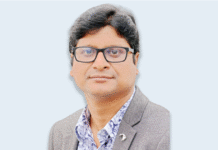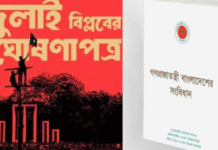
The formation or the journey of an Election Commission has rarely been a welcoming event in Bangladesh. It is always the chief election commissioners (CECs) who are blamed for all electoral evils. Their image starts to tarnish as soon as they are sworn in. But the simple truth is that, irrespective of whether they are impartial or want to hold credible elections, there is little space for them to act independently. We may not like it, but a CEC has no choice but to follow the sitting government’s—more precisely, the ruling party’s—arrangements in Bangladesh.
Ironically, however, a failed Election Commission is negatively branded with its CEC’s name. I have little doubt that the defamed CECs would have performed differently under a neutral government, whereas they surrendered their conscience to the government—either because they were weak or because their appointment demanded unconditional loyalty. Even with this knowledge, people want to see a CEC having the courage to disregard the establishment. To me, they want a TN Seshan taking the role of their CEC—an impossibility at the present moment.
Many would ask: Why couldn’t we find a TN Seshan—i.e. the man who cleaned up the Indian electoral system in the 1990s—in Bangladesh? I can cite at least two reasons. To begin with, Indian politicians, even in their quest for power, did not intend to completely destroy their constitutional institutions. On the other hand, I am sure Indian pressure groups or intellectuals would not have accepted any such move. As a result, TN Seshan had a fertile land in which to work independently, without fear.
In Bangladesh, we are still looking for an ideal CEC. Will one be born? If yes, will they be able to work independently? Mahbub Talukdar, a member of the Nurul Huda commission, showed some courage. Yet, he was not the decision-maker. KM Nurul Huda, probably the most incompetent and shameless CEC in Bangladesh’s history, sidelined Mahbub and upheld the government’s agenda. As a matter of fact, what determines an answer to my question is the mindset of our politicians and intellectuals. If they all agree today, a courageous CEC will emerge tomorrow. But will they be able to conduct free, fair and impartial elections here? Again, the answer rests on the mindset of our politicians and intellectuals.
If we analyse the elections held in recent times during the Awami League’s regime, what can we conclude? The party’s mindset is completely focused on winning elections, by whatever means possible—not on credible elections. They are not bothered about the gradual disappearance of the institution of democracy. The parliamentary elections of 2014 and 2018 were nothing if not farcical; yet, it wasn’t just the ruling party activists but also many of the country’s top intellectuals who extended their unequivocal support for the regime. The common objective of this coterie comprising both political and non-political elements have left no scope for acceptable elections in Bangladesh under a partisan government.
Unsurprisingly, a few people are always excited about new laws. For those having common sense, this enthusiasm is misplaced. We all know that neither the enactment of legislations nor even the sacred provisions of the constitution can protect the people’s rights—unless their enforcers are willing to do so. Who can deny the long saga of abuses of our constitution and our laws for the last 50 years? The newly passed legislation in order to form an Election Commission has also proven to be unhelpful. The Awami League’s intention behind enacting the law is not clear. Was it in good faith?
The appointment of the current Election Commission under the Chief Election Commissioner and Other Election Commissioners’ Appointment Act, 2022 has brought no significant changes to the existing situation. Whoever becomes a CEC through the given process is unlikely to serve impartially. The apparatuses of the state are fully controlled by the sitting government and will not act against the leader’s wish.
Habibul Awal’s action will prove whether he will act as TN Seshan. Only time will tell whether the ruling party will start to engineer the upcoming general elections in the way they did before to ensure their return to power. If they do, Bangladesh is certain to experience another controversial election in late 2023 or early 2024. No legislation, including the newest one, can prevent that from happening.
In Bangladesh, the legal framework for holding a free and fair election existed under the applicable laws, even before the enactment of the new law. The difficulty lies in the lack of will of those running the government and those who follow them. The ruling party and their ideological intellectuals or pressure groups are adamant to hold on to power. Unless this attitude changes, an entire generation will be deprived of the chance to cast their first vote.
For Bangladesh, the sole mechanism to ensure trustworthy elections is returning to the interim government who will exercise constitutional powers to impartially conduct general elections. Despite the Supreme Court’s verdict against the non-party caretaker government, which in my opinion is a judgment of misconceived jurisprudence, our politicians must act for an ultimate consensus—that of restoration of the interim government for free, fair and impartial elections.
A legislation or a Kazi Habibul Awal will not be able to rescue us.
Abu Sayem is a barrister and a human rights defender.


 For all latest news, follow The Daily Star’s Google News channel.
For all latest news, follow The Daily Star’s Google News channel. 







